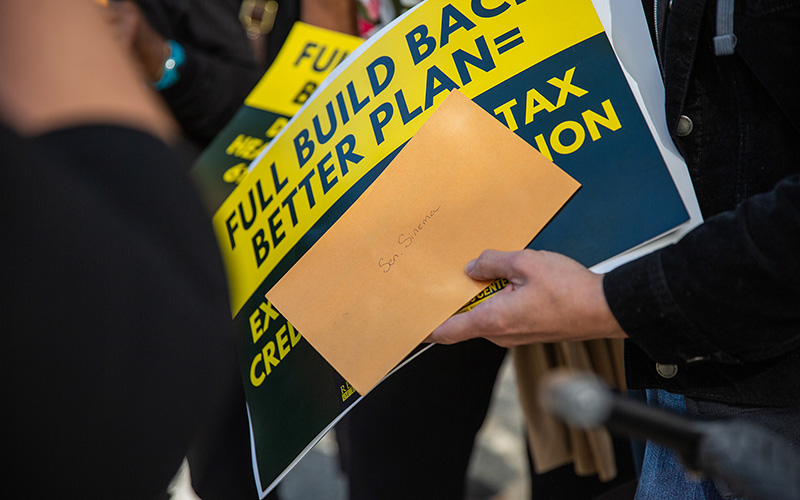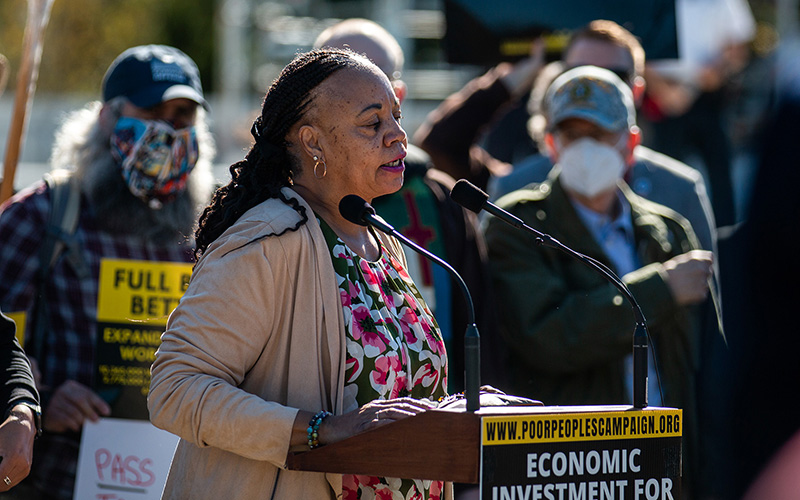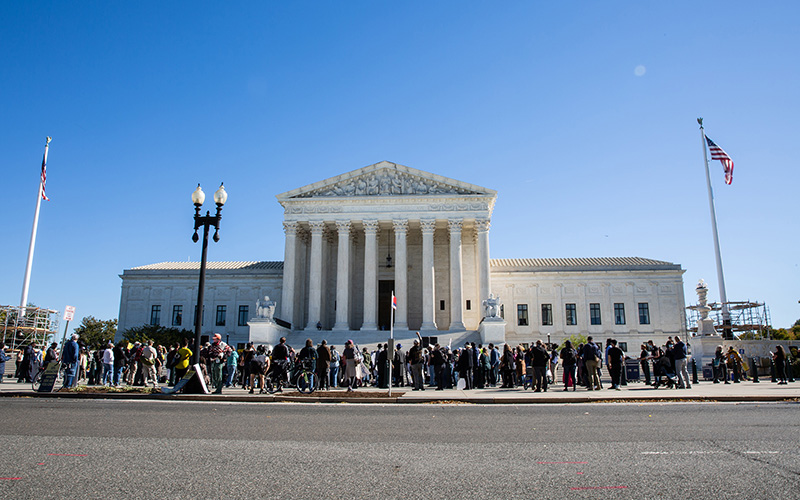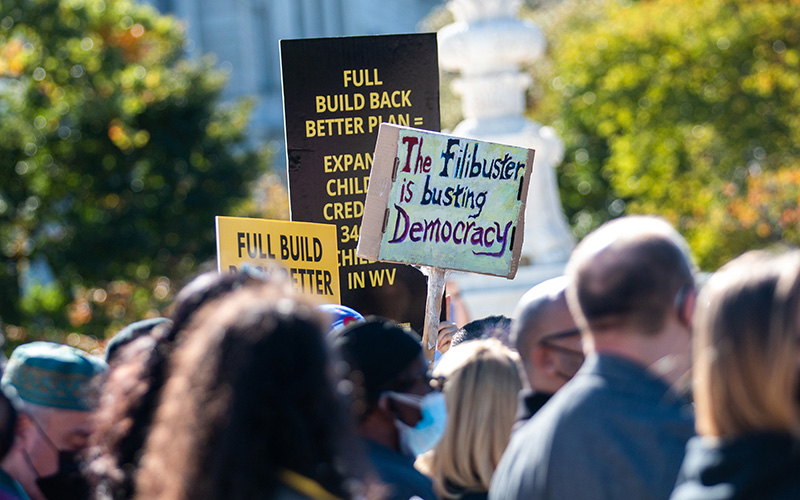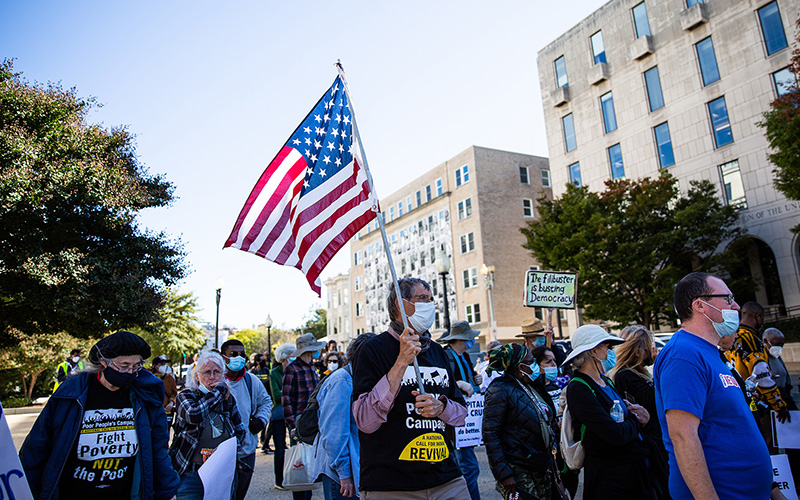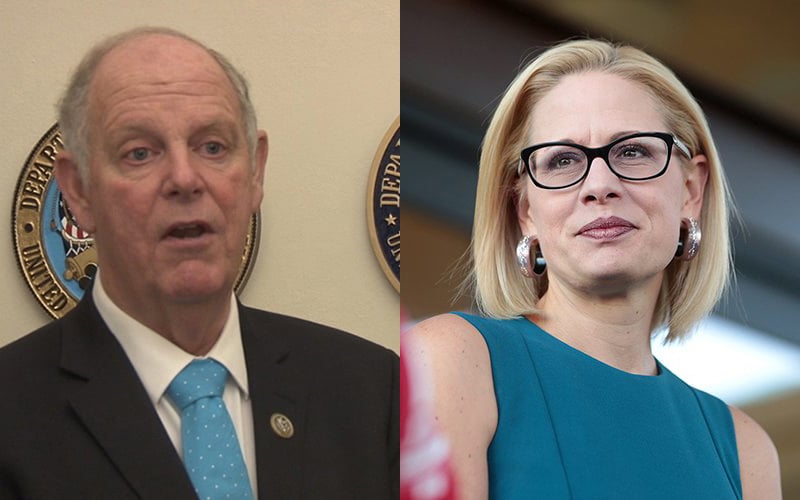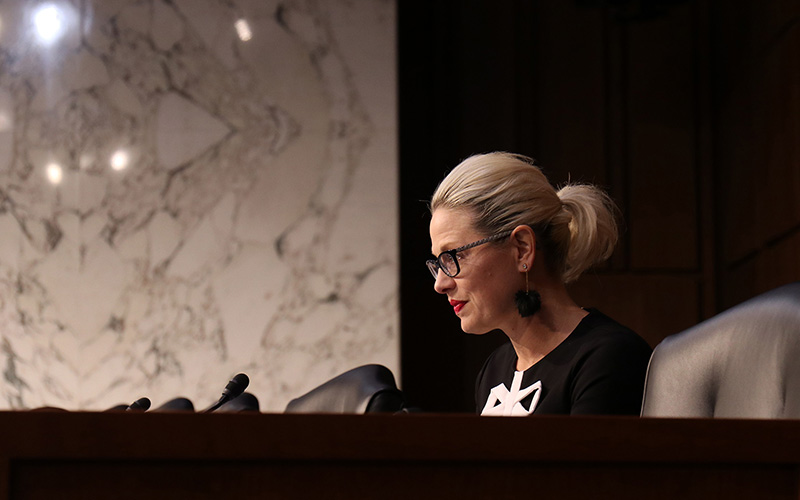WASHINGTON – Hundreds of protesters, including several from Arizona, gathered on Capitol Hill Wednesday to demand that Democrats fulfill promises on childcare, healthcare and immigration reform by taking action on President Joe Biden’s “Build Back Better” plan.
That plan, which started out as a 10-year, $3.5 trillion proposal, has reportedly been whittled to half that size, in response to concerns from moderate Democrats who are worried about the cost, including Arizona Sen. Kyrsten Sinema.
But Joan Steede, a home health-care worker from Phoenix, said Sinema and fellow moderate, Sen. Joe Manchin, D-W.Va., need to look beyond the cost to consider what it will cost society if the plan is not passed.
“I beg Kyrsten Sinema to see the goodness in this plan,” said Steede, as she rallied on the steps in front of the Supreme Court Wednesday. “Just pass it, and then what doesn’t work we’ll take out in the next 10 years.”
Steede was among the hundreds of protesters in three separate rallies who converged on Capitol Hill to press for action on the plan. They came from religious organizations and represented environmental, immigrant and anti-poverty causes.
The protesters chanted and sang on a breezy morning under a bright blue Washington sky, as Capitol Police officers looked on. While there were a handful of arrests, there were no confrontations with police at the noisy but peaceful protests.
A few advocates who have been on a hunger strike at the White House to bring attention to the issue were on hand in wheelchairs, and speakers took turns at the microphone.
“We need to stop asking, ‘How much does a bold Build Back Better agenda cost?’ and instead ask, ‘How much does it cost not to Build Back Better?” said the Rev. William J. Barber II, co-chair for the Poor People’s Campaign: A National Call for Moral Revival.
“We can’t afford to compromise,” Barber said. “We can’t afford half of a democracy.”
The plan has been touted by the Biden administration as a generational shift in social spending and policy by the federal government. It would fund community college tuition, child care and health care, lower prescription and housing costs, and invest in job training, among other initiatives. It also includes renewable and clean-energy programs.
Biden has insisted that the spending would not add to the federal deficit since the plan is designed to pay for itself through higher taxes on corporations and high-income earners.
Republicans are uniformly opposed to the bill, which makes every Democratic vote critical in the House, where Democrats have a slim majority, and in the evenly divided Senate. Despite Biden’s assurances on cost, moderate Democrats in both the House and Senate have balked, while progressives have pushed for the full bill.
But after weeks of negotiations between the White House and congressional Democrats, the plan has been cut sharply. Rep. Pramila Jayapal, D-Wash., said last week after a meeting of progressives with the president, that the package was closer to $2 trillion over 10 years.
Protesters Wednesday criticized the Democrats’ hesitation in passing the plan.
“We the people – poor people, low-wage workers, essential workers, people of faith and moral advocates – are tired of being pawns in a political game that hurts us, while greedy and corrupt corporations enrich themselves off our poverty,” said the Rev. Liz Theoharis of the Poor People’s Campaign.
Beatriz Gutierrez, with the Arizona Dream Act Coalition, flew from Arizona to be in Washington Wednesday and deliver the demand that Biden fulfill his promise to include undocumented immigrants in his spending package.
“We are here to ask Congress to vote in favor of including us (immigrants) in the package,” said Gutierrez, speaking in Spanish. “We are here to ask Biden and the vice president to fulfill their promises that they gave us that they were going to be with us.”
She pointed to the millions of people that will be affected if these promises are not fulfilled and said elected officials need to help the people who put them in office.
“There are millions of people that would benefit if they include us in their immigration package,” Gutierrez said. “We can’t vote … but we helped get people out to vote so that they (Biden and Vice President Kamala Harris) could be in the White House today.”
Steede said the plan would address costs of prescription drugs and health care – a priority for her since she works in what she called a broken health care system that does not benefit the poor.
“If you’re going to get sick in America, be rich,” Steede said. “Because poor people die poorly in the country under the worst conditions.”
Protesters marched from the Supreme Court to the nearby Senate office buildings where they had hoped to deliver letters to Sinema and Manchin. But they were turned away by police, because the buildings are still closed to the public as a COVID-19 health measure.
A spokesperson for Sinema said Wednesday that constituents with concerns about the bill can reach out to the office by phone or email, and that the senator and her staff “meet with individuals and groups from across Arizona on a consistent basis,” including at a recent roundtable on local infrastructure issues in Nogales.
“Kyrsten will continue meeting with Arizonans with diverse views to inform her work in the Senate,” the spokesperson said in an email.
Sinema has been largely silent on the negotiations, and that will likely continue, according to the statement.
“Kyrsten is working directly in good faith with her colleagues and President Biden on the proposed budget reconciliation package,” it said. “She does not negotiate policy specifics through the press because that hurts her ability to solve problems and get things done for Arizona.”
But Steede urged Sinema to act on the bill, saying that, “I think if it passes … Krysten Sinema would see her state blossom.”
“You can’t cherry-pick this bill,” Steede said. “Just pass it.”

